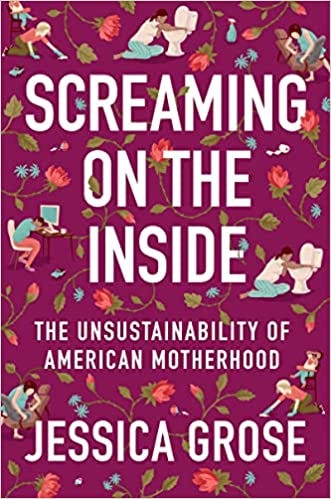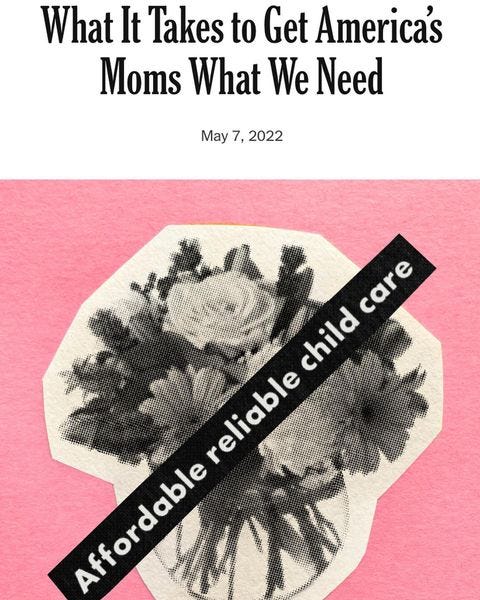"The same shit in a new package"
Jessica Grose on how American motherhood has changed a lot and not at all
Ever since I started seriously writing about motherhood, I’ve read and admired the work of Jessica Grose. Prior to writing her excellent newsletter for The New York Times, Jessica was a lead parenting editor and columnist for NYT. She’s written about rejecting parental guilt (hell yes), reported on how Covid “exposed the great lie of American motherhood,” and has even covered momfluencers here and here. If there’s something happening that impacts American mothers in almost any way, I always look to Jessica to cover it with thoroughness, thoughtfulness, and care. And she never lets me down.
I’m delighted to share a conversation between Jessica and I about her new, indispensable book, Screaming on the Inside: The Unsustainability of American Motherhood.
Sara: First of all, THANK YOU for this book. It’s so beautiful, smartly-researched, and validating in every possible way. I’d love to know how the book came to be.
Jessica: Thank you for really seeing the book. It means so much to me! I have been thinking about this book in some form for at least eight years. The germ of it started when I had a difficult pregnancy with my older daughter, who is about to turn 10 (how is that possible?). As I talk about in the book, I had hyperemesis and got really depressed. I was so sick, I had to quit a job. Despite having every privilege imaginable, the structures of work and health that exist in the United States could just not deal with my condition in any humane way. While I had reported on these topics before I got pregnant for the first time, having my working life implode dramatically really made me devote myself to unpacking a lot of the ideas we have around ideal motherhood.
But, the pandemic really crystalized everything for me, because all the structures fell away for everyone. And, I think some folks who were only aware of how hard things were subconsciously, had everything come to the surface. I think a lot of moms were also surprised to the extent to which we were expected to pick up the pieces without complaint when things fell apart.
Sara: I so appreciated your book’s historical context for how American motherhood came to be seen as something a mother must “perfect” (even in terms of pregnancy). You write: “Early modern pregnancy manuals spent a great deal of time warning women that their thought crimes could alter their growing feti, and in general, women were thought to be more susceptible to the devil while they were pregnant and postpartum.” I wish I could say that we’ve moved entirely away from blaming mothers for parenting outcomes wholly out of their control, but obviously we haven’t. How much do you see these historical precedents bleeding into today’s fear-mongering of mothers, and how much do you think this fear-mongering is born from current events and fresher moral panics?
Jessica: One good thing about covering this beat for so long is I realize that nothing is new under the sun. And so it was almost refreshing to read women’s diaries and letters from 200 years ago and see them express some of the same frustrations, upsets and exhaustion around motherhood we experience today. One of the major themes of the book is that these ideas are so successful precisely because they shapeshift, molding to whatever is in vogue. So yesterday’s fear of thought crimes are today’s fears about prenatal anxiety.
Sara: This line brought tears to my eyes: “You are making the best choices you can in a society that holds mothers to unachievable standards.” It’s such a simple statement, but it really moved me. Mothers are so (depressingly) used to being held to these unachievable standards that it almost comes as a shock when someone simply acknowledges that motherhood is difficult (impossible) in America because of the standards (and systems of course), not because of our individual failings! I’m wondering if you had any watershed moments in your own maternal journey when the lightbulb went off for you? Do you think there’s a growing awareness that these standards are unachievable? Especially in the aftermath of covid lockdowns, etc.
Jessica: That first pregnancy of course was an eyeopener: I wasn’t entitled to any paid leave because I hadn’t been there a year, and if I had gone on short-term disability it would have paid me about 5 percent of my salary. Hyperemesis is the most common reason for hospitalization in the first half of pregnancy. It’s not exceedingly rare. And yet, nobody really knew what to do with me and it was treated as this crazy unusual thing, and was totally my own individual problem to handle.
I think going back to a staff job in order to support a second child was another moment when the starkness of the system not being built for modern families was very clear. The systems are built for two-parent families where one parent stays home.
To be transparent, our lives were very manageable when I was freelance, and we had one kid under 3. We had a nanny about 30 hours a week and otherwise I was the default parent and that worked for us. Those days were very happy. But the second we had two jobs that required equal in person time, we started to have practical conflicts. It was not because my husband wasn’t doing his fair share. He does more child care than I do. But because there are only so many hours in the day, the school day does not align with the work day, and we don’t have enough time off to cover every school vacation. We live near my parents who help us tremendously, but there are still so many times where we have child care holes and are cobbling everything together.
I absolutely do think there is growing awareness that these standards are unachievable simply because so much is still in shambles. There are 100,000 child care workers who left the industry because they can make more at other jobs, and honestly good for them. They deserve to be paid a living wage, the work they do is vastly important to society. Many of them are parents themselves. More people understand that these systems are all connected and putting anything on any individual parent is a fool’s errand.
Sara: You write about how setbacks in maternal agency often coincide with social progress and movements towards gender egalitarianism, citing how, when Victorian women wanted to participate in things like suffrage and temperance movements, conservatives started to zero in on pregnancy and women’s so-called “fragility” as a way to pressure women back into the domestic spheres. You mention pregnant women being warned against reading “exciting novels” (!!!!) And then in the 1950s this happened again, with the idealization of Donna Reed-esque mothers, when (you point out) single-parent households were on the rise and more and more mothers were seeking work outside of the home. I wonder if you see a connection between the insurgence of trad wife momfluencers and Moms for Liberty infiltrating school boards (to “protect” their children from things like sex education and critical race theory) and progressive mothers absolutely fed up with institutional motherhood in America. As so many of us demand changes are made to broken, unsupportive systems undergirding maternity, do you think mamas waxing poetic about being pro-femininity/anti-feminism are sort of an inevitable pushback?
Jessica: I definitely see the connection. Whenever there’s a move forward, there will always be someone pushing back. But I will say: go be a trad wife, if that’s your bag. If that’s what you want to do with your one wild and precious life, and it works for you and your family, it’s none of my business. Just leave me out of it. The second you’re trying to ban books so MY children can’t read them, either, or prevent my children from getting any kind of proper education, then we have a problem.
Sara: You write about being racked with guilt about treating your prenatal depression: “I knew I would blame myself for selfishly choosing relief over my baby’s health” - have you noticed shifts in maternal health stigma since then? I experienced pretty terrible postpartum depression, and maybe it was because I was the first in my peer group to have a kid, but I feel like there’s so much more cultural awareness around maternal mental health now. But this could also just reflect the social media echo chambers I’m currently swimming in.
Jessica: I think it really depends on your community and your culture. I talked to lots of people for the book whose cultures did not encourage therapy, or couldn’t really understand not being “happy” during pregnancy, they just couldn’t compute. My own reaction at the time, I think was also borne from being depressed and anxious. Like, I was already in a very vulnerable condition so it was a mind space where it was easy to self-blame. I think now, ten years later, I have so much empathy for myself back then, and I wish I could tell her it wasn’t her fault.
Sara: I so appreciated your vulnerability in your chapter on new motherhood. You write that, “The fear of irrevocable damage made me keep trying [to breastfeed]” even though it wasn’t feeling like the right choice for you and your baby. As a reporter, how many times has this theme of fear come up in relation to motherhood? How different might life be for mothers if we weren’t so often operating from a place of fear and instead living from a place of self-knowledge? I think a lot about how momfluencer culture can sometimes shape (and pervert) our own self-awareness. We’re surrounded by so many strangers’ “best” ways to mother that it’s sometimes difficult to ascertain what’s “best” for us as individuals.
Jessica: It comes up all the time! All the time. I think because we are just getting so much information all the time, it has broken our sense of risk or proportion. Life would be much better if we mothered from a place of self-knowledge and also, I think, community connection. I take advice from my friends and family who love and respect me, and I love and respect them back. They know my particular circumstances, and want what’s best for me. It’s easy to forget that randos on the Internet might not know or want what is best for you or your family.
Sara: The more I learn about the cultural history of the American mother, the more I am reassured that our constructions of idealized maternity have always been directly connected to either a) the bottom line or b) white men retaining social control. Thoughts? (Super casual question I know :) )
Jessica: I would often joke while I was researching the book that every time I would look into where some bad idea about moms came from, it was always from a Victorian eugenicist.
Sara: You write about how, for much of maternal history, cultural, medical, and political focus has been aimed at the wellbeing of the child, and recommendations and legislation often stem from what is deemed best for the kid (or fetus) despite sometimes paltry or weak evidence that such and such intervention will guarantee a good outcome for the child. And there’s almost zero consideration of how the wellbeing of the mother impacts the wellbeing of the child almost more than anything else ever could. Please tell me this is changing. Related: there’s a special place in hell for the male pediatrician who shrugged and wrote down the name of a fucking baby sleep book when I told him my newborn wouldn’t sleep flat on his back in a crib and the only way he WOULD sleep (and the only way I could get any sleep) was if someone was holding him or he was in a swing. I left the appointment in tears and it wasn’t until my postpartum doula helped me assess the various sleep risks unique to our situation that our family came up with a decent sleep solution for baby AND parents.
Jessica: I do think it’s changing. There are lots of providers who treat the mother and child like an interconnected dyad, and think about what is best for the entire family. Of course, not everyone has the message, but it has definitely improved since I first became a mom.
Sara: In your years reporting on motherhood, how have you seen the proliferation of momfluencer culture impact individual mothers’ experiences of motherhood? How did your own experience of the culture influence how you covered motherhood for The Times?
Jessica: I think it’s just the same shit in a new package, in a lot of ways. We used to get these ideas of perfection from TV, movies and women’s magazines, and now we just get them from social media. I just listened to an episode of “You Must Remember This,” Karina Longworth’s podcast about classic Hollywood, which was about Fatal Attraction. [Sara here - I loved this ep too and rec Karina’s entire series on the Erotic Eighties!] And that movie had so many demented ideas about mothers versus career women, and was made in that 80s era of anti-feminist backlash. I was getting so angry listening to it, and was reminded that media has just been reforming the same ideas and selling them back to us for ages.
Sara: How did you cope with both parenting during the pandemic and covering the heartbreaking, frustrating, enraging stories of other people parenting during the pandemic? I imagine that must’ve been a lot - to hold your own grief and fear alongside so many others’ griefs and fears. More broadly speaking, how do you avoid sliding into despair re: American motherhood (asking for a friend)?
Jessica: In some ways reporting was helpful to me in that early pandemic period, because it felt like something practical to do in the world. And I felt honored to record those stories for posterity. I am grateful for every parent who talked to me, took time out of their day and shared their vulnerability with me. Also, it made it easier to compartmentalize my fear about everything by working all the time. Which I….would not really recommend as a coping mechanism because I am very tired now!
I don’t find despair productive. Whenever I get bummed, which is often, I think about all the parents and activists out there working to make change. And I really do see news stories every week about laws passing at the local level. Two states passed paid leave from the time I started writing the book to the time I handed in my final draft; New Mexico just passed child care legislation. Things are happening all the time, they just don’t make the front page.
Sara: I was so fascinated by your reflections on the early days of the pandemic as someone tasked with covering how parents were coping with the pandemic while also BEING a parent coping with the pandemic. You mention feeling “totally ill-equipped to be making any of these decisions” - decisions you as an individual were forced to make. If there’s anything that’s shed light on how woefully unsupported mothers are in America, it’s the fact that we were all expected to become infectious disease specialists, therapists, and educators almost overnight once lockdowns went into effect. What do you think will ultimately move the needle forward in terms of structural support and reform? Powerful rich men being convinced that supporting caregivers is good for the economy?
Jessica: Honestly, I think it’s just time. I think younger generations realize that caregiving is important, and I think more and more people of all genders and political persuasions are coming around. I interviewed a pollster last week who mostly surveys republicans, and she told me that a group that really wants paid leave is rural men. Because they often work hourly jobs without any paid time off, and if they don’t work, they don’t get paid at all. They want to be able to support their wife who just had a c-section, for example, when there’s no other care close by. More and more, I think everyone is seeing that the country just cannot function without more of a safety net, without more humanity.
Sara: I really loved this passage: “As individuals, what we can do today, and every day moving forward, is allow ourselves and other moms to be fully human. Because there is something deeply dehumanizing about constantly being told to erase parts of yourself.” What does this mean for you personally? How can we live our lives holding space for others’ maternal experiences, and how does the holding of space make our own lives more expansive?
Jessica: In my own life, I think it tends to mean really deeply listening to our friends and not reacting with our own baggage around motherhood. A lot of us have deep guilt and shame and really specific triggers, and I have found that with my friends, letting all that go is the best feeling. We don’t need to hold onto it.
Housekeeping!
Do you have a topic, trend, or burning question about momfluencer culture, Ideal Motherhood™, or something else entirely you’d love me to cover? Just respond to this email or fill out this quick form. I will keep all names anonymous!






